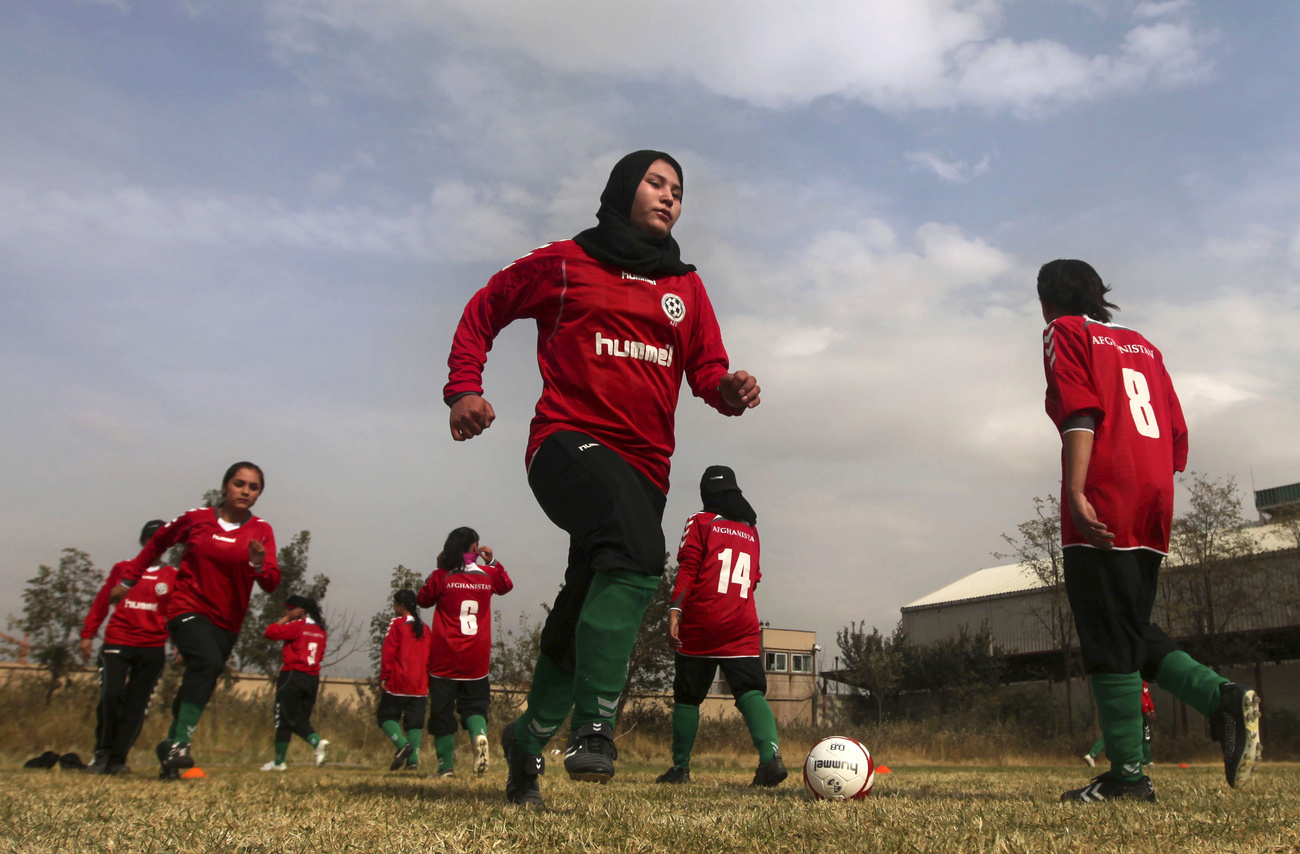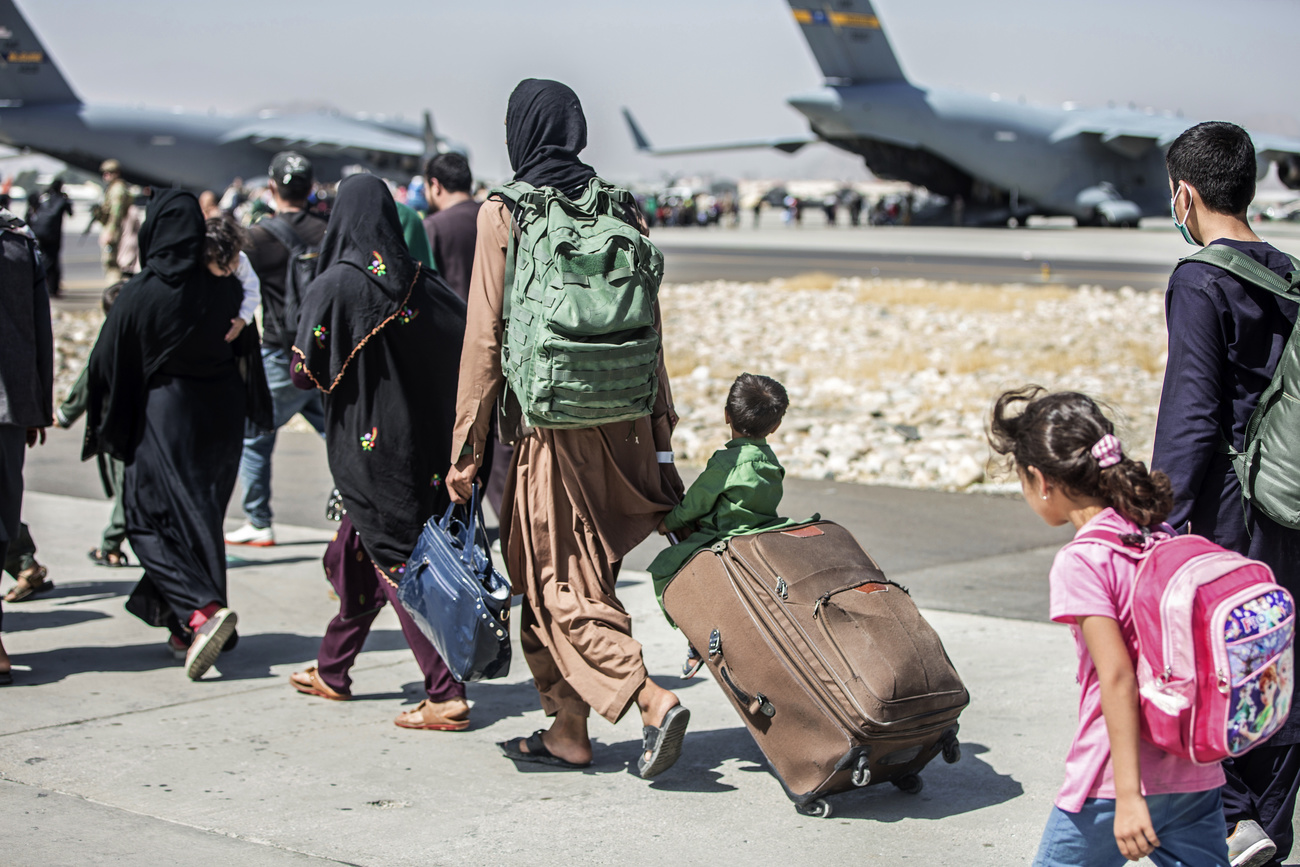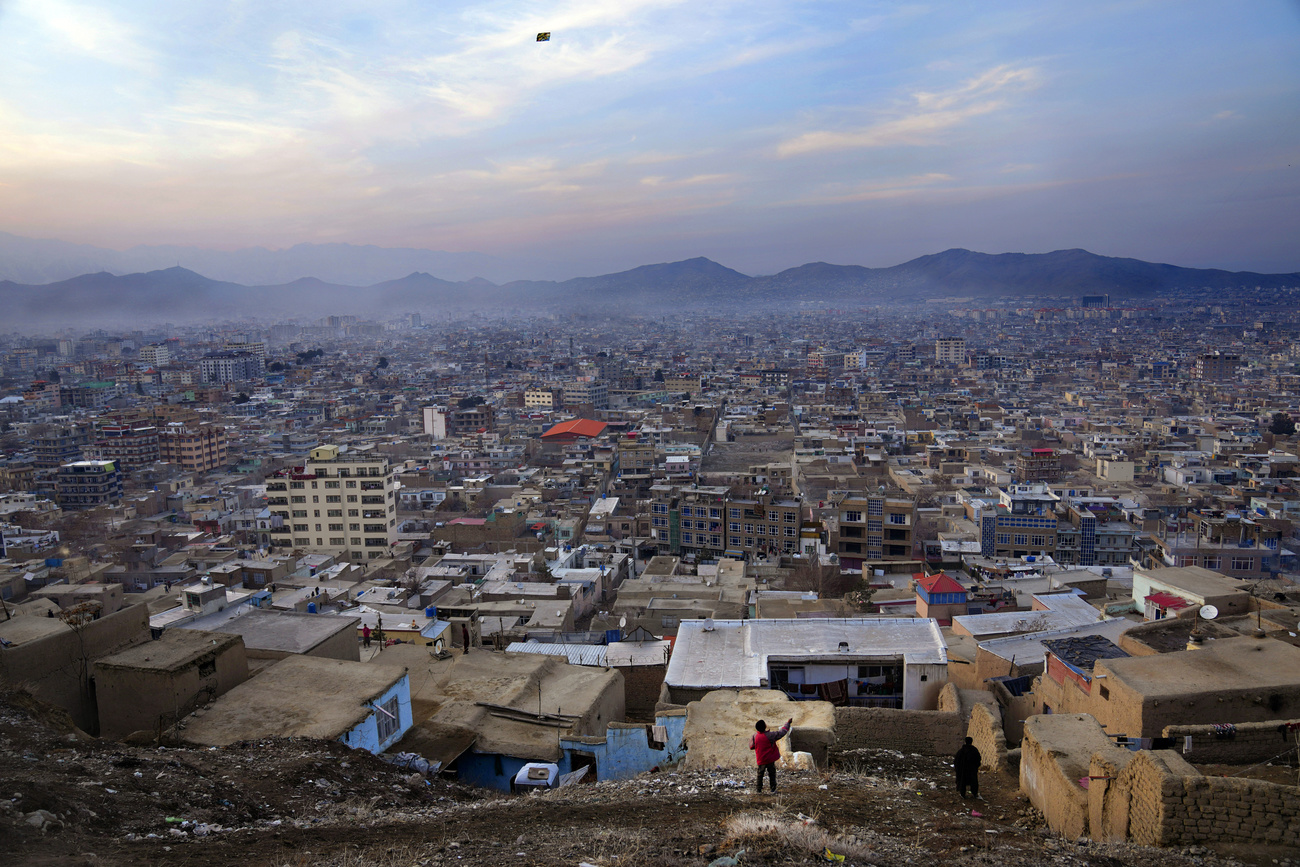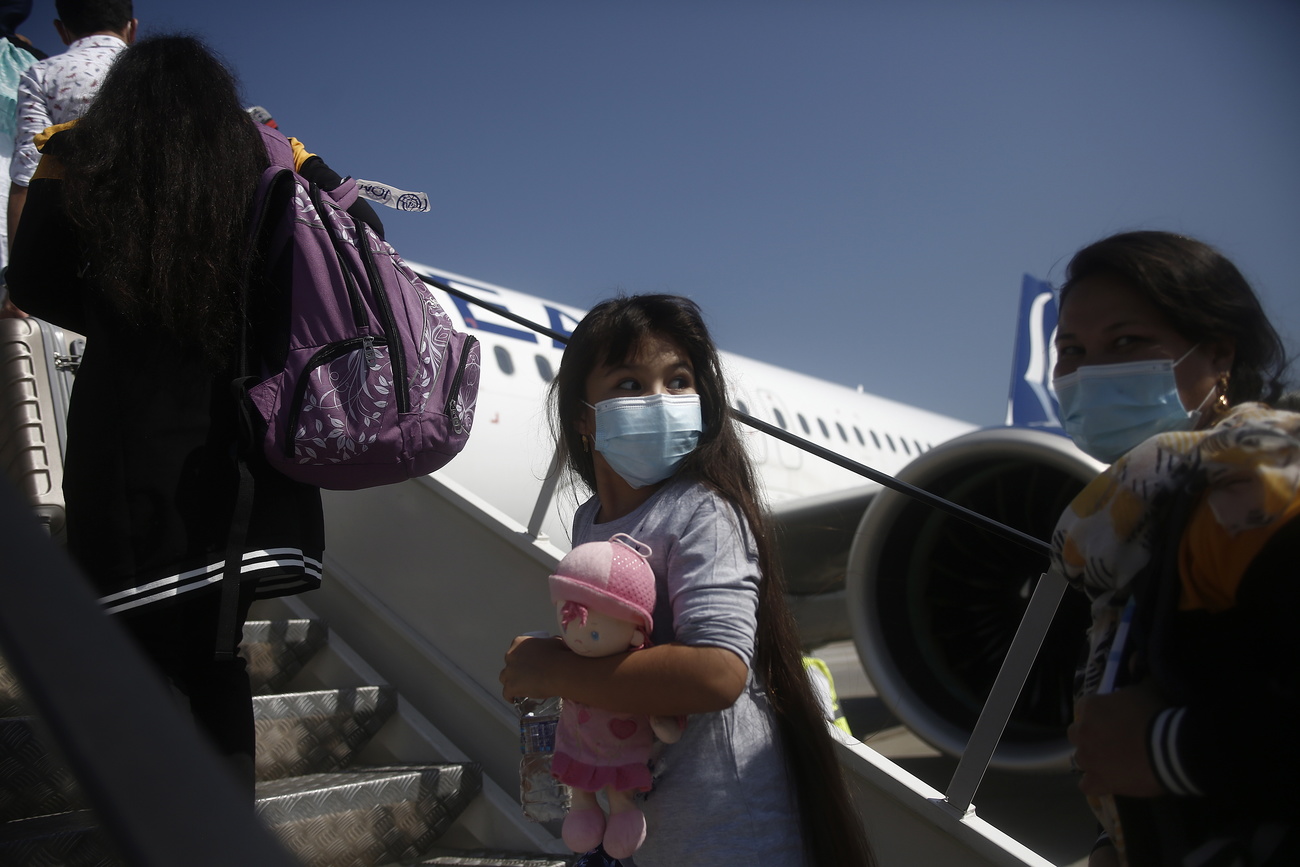Afghan women footballers in exile fight to keep their sports dreams alive

After the Taliban returned to power last August, Khalida Popal, former captain of Afghanistan’s national women’s football team, urged female players to burn all evidence of their participation in the sport. Two former team members now living in Switzerland share their worries for athletes who remain in the country and fear retribution from the militants for their past activities.
On a cold, blustery March evening in the Swiss capital Bern, a dozen men stride off a floodlit football pitch, making way for five young women dressed in track pants and sweats. For the next two hours, the field is theirs as they practice kicking, dribbling and passing – breaking away only for a sip of water or to share a laugh over some shaky defending.
Sahar runs for a solid 40 minutes even though she is still nursing a foot injury sustained the previous week. “I’m taking painkillers,” she shrugs with a smile. “Football for me means freedom and movement, and I love to move.”
Every Friday evening, she’s joined by her former Afghan national teammate Armisa, who makes the two-and-a-half hour train journey from her home in St. Gallen. Together they’re offering free trainingExternal link for women of all nationalities with the hope of eventually forming a team.
Although they don’t have enough players yet, they relish the opportunity just to be on the pitch. The two women – who do not want to give their real names out of fear for the safety of relatives in Afghanistan – first met in Kabul a decade ago. Barely in their teens, they were playing for their respective schools when they were spotted by talent scouts and signed up for the nascent national women’s team.
But dreams of playing for their country were short-lived. Six years ago, as problems with the Taliban mounted, Sahar and her family left Afghanistan. Her teammate’s departure followed a few years later.
“I wanted to do something for my country but there wasn’t any respect in Afghanistan for the kind of dreams I had,” says Armisa. “I left so that I could be free to play football.” Not yet 18, she travelled alone through Iran and Turkey and spent a year in Greece before settling in Switzerland.
For the pair, training has become an act of solidarity with female athletes in Afghanistan following the return to power last August of the Taliban, who announced a ban on women participating in sports because it went against Islamic values. Fear of retribution for their past activities has left many sportswomen still living in the country desperate to leave.
Fighting hard to play
The Islamic fundamentalists’ return marked the end of two decades of slow, painful progress for women’s rights that began after the fall of the first regime in 2001. Although they were finally allowed to pursue sport at a competitive level, female athletes faced dangers, including physical abuse and death threats, amid a lack of social acceptance for their choices.
Some footballers were too afraid to tell their families they played for the national team, says Sahar, who was part of the squad for a year and a half. Armisa never gained the support of her family, aside from her mother.
“My older brother did all sorts of things to try and stop me,” she says. “It was very difficult for me to play in the beginning.”
Video: Armisa and Sahar talk about their days of playing football in Kabul
As well as family disapproval, the women also faced abuse just walking to and from their training ground.
“People had terrible words for us,” says Armisa, adding that it was difficult for women to travel alone, especially in sports clothing. Many of the players suffered sexual harassment on the streets.
But the abuse only made them more determined. “We wanted to fight harder – it gave us more motivation to play,” explains the soft-spoken Afghan.
Travelling abroad for matches and meeting other young women in the sport was also a source of inspiration, says Armisa, who participated in tournaments in Norway, Qatar and Sri Lanka during her three years with the national squad. She proudly shows a photo of the team in Norway posing with Popal, who fled Afghanistan in 2011 after receiving death threats and now lives in Denmark.
The Taliban’s return has been a huge source of anxiety for both Sahar and Armisa and left them fearful for players and family members in their homeland.
“When I heard that the Taliban took over, I was in complete shock,” says Armisa. “I can honestly say I cried for a month.” Her mother and two siblings made it across the border to Pakistan but until recently, three other members of her family were still in hiding in Kabul, including her father, who feared retaliation from the Taliban for his work with the Afghan intelligence service. Their predicament caused Armisa so much stress that she found it hard to focus at work and quit her apprenticeship in housekeeping earlier this year.
Sahar too has struggled to make sense of events in her homeland.
“In those 20 years [between 2001-2021] Afghanistan made so much progress – this is all broken and gone now,” says Sahar. “That’s very painful for me.”
In search of a permanent home
Fearing the worst, Popal, players’ unions and activists led grassroots efforts to evacuate dozens of female players and family members. Many were resettled in Australia, Portugal and the United Kingdom.
Football’s world governing body, FIFA, organised its own evacuation with help from the Qatari government – in all about 140 female football players, officials and coaches, plus 29 female basketball players and family members, were given temporary shelter in Albania.
At the time, Zurich-based FIFA saidExternal link the people it evacuated had been “in critical danger due to their links to women’s sport.” An analysis last autumn by the non-governmental Swiss Refugee Council notesExternal link that sportswomen were “particularly threatened under the new regime.”
The Swiss foreign ministry said it has urged the Taliban – which has struggled to obtain global recognition as the legitimate government of Afghanistan since returning to power in August 2021 – to protect the rights of women and girls.
“Every individual, including women and girls, must have the possibility of practicing sport,” the ministry said in an email to SWI swissinfo.ch, pointing to Swiss engagement with the Centre for Sport and Human Rights as an example of how it is working to achieve this goal.
Switzerland is a founding member of the centre, a non-profit organisation set up in GenevaExternal link in 2018 to promote respect for human rights, including the participation of women and girls in sports. The centre declined a request for an interview, but in an emailed statement said it had “discretely connected behind the scenes governments, activists, international sport federations and UN agencies who were active on the field and worked to secure the safe passage for many female athletes.”
FIFA, like many international sports bodies, requires member states fielding a men’s national team to also have a women’s team. It said that “discrimination in any form has no place in football.” Afghanistan, however, continues to field a men’s teamExternal link, according to FIFA’s latest rankings. The women’s team, on the other hand, has not played an international match since the Taliban returned to power.
Although Armisa and Sahar are happy that several players have been able to regroup and train again in the countries where they’ve gained asylum, they’re worried about the women athletes still looking for sanctuary. The FIFA evacuees who were sent to Albania, for example, are still there, although the association told SWI swissinfo.ch that it is “in contact with various authorities and organisations […] to help find [them a] permanent home”.
Sahar and Armisa believe states should be more generous in their resettlement policy.
“These women are looking for a safe country to accept them,” says Sahar. “It’s up to governments to open their borders and give these women a place.”
Switzerland has not been asked to resettle the evacuees in Albania or any other Afghan sportswomen who fled after the Taliban’s return, a spokesperson for the State Secretariat for Migration told SWI swissinfo.ch. So far, it has only given “laissez-passer” to 38 female cyclists, coaches and their family members at the request of the Swiss-based World Cycling Union (UCI), which helped to organise their evacuation.
According to Armisa and Sahar, many national team members remain in Afghanistan. Mara Gubuan, founder of Equality LeagueExternal link, a US-based NGO that worked with FIFA on the evacuation, says that over 100 female athletes – primarily basketball and football players – who had been on FIFA’s evacuation list are still in the country.
Tomorrow’s leaders
Gubuan’s hope is that those who are at riskExternal link will find a way out despite the logistical, administrative and security challenges involved. But she also fears the impact on society if all the top female athletes leave the country.
“It’s heartbreaking,” says Gubuan. “Sport helps to develop leaders in society and in every sector. So the Taliban’s policy will weaken Afghanistan by restricting its women.”
Armisa and Sahar aspire to be among those future leaders, even in exile. They’ve learned German. Sahar is completing an apprenticeship in information and communications technology. Coaching football every week with help of a local refugee support organisation, Mazay, and transferring their passion for the sport to other women is also giving the two of them a path to rebuild their lives.
Reflecting on the long road she’s travelled since leaving Afghanistan, Sahar says obtaining her residence permit six years after arriving in Switzerland was “like getting a second life”. But she is tormented by the uncertain future facing women in her homeland and those waiting in neighbouring countries. She’s also frustrated by the lack of response from the international community.
“Many women went out onto the streets and asked for their rights but no one heard them – no one helped them,” she says, sitting under the late afternoon sun in a park not far from the Swiss parliament building a day after training.
As she speaks, a large crowd on parliament square is listening to Ukrainian President Volodymyr Zelensky as he gives a video address to the Swiss people. Since the war began in February, tens of thousands of Ukrainian refugees have arrived in Switzerland and obtained a special protection permit. By contrast, the government was criticised by refugee advocates, left-leaning parties and some major cities for accepting only about 300 Afghan refugees last year, most of them local staff of the Swiss Development Agency and their relatives.
“I hope the [world’s] governments won’t forget the women of Afghanistan,” says Armisa, her soft voice barely audible as church bells start to peel across the street.

More
What’s next for the women of Afghanistan?

In compliance with the JTI standards
More: SWI swissinfo.ch certified by the Journalism Trust Initiative















You can find an overview of ongoing debates with our journalists here . Please join us!
If you want to start a conversation about a topic raised in this article or want to report factual errors, email us at english@swissinfo.ch.